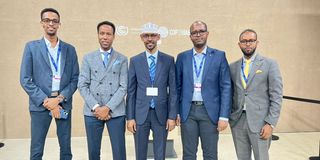Somalia commits to cutting down on cooling-related emissions

Somalia’s Energy and Water Resources Minister, Jamal Taqal (middle), and other delegates from Somalia at COP28.
What you need to know:
- The pledge was made by Jamal Taqal, Somalia’s Energy and Water Resources Minister on the sidelines of COP28.
- Global Cooling Pledge commits countries to reduce by 2050 their cooling-related emissions by at least 68 per cent.
Somalia has joined other nations in a pledge to cut down on cooling-related emissions at the United Nations climate summit in Dubai.
The pledge was made by Jamal Taqal, Somalia’s Energy and Water Resources Minister on the sidelines of COP28.
The United States, Canada and Kenya are some of the 63 countries that have also committed to this cause.
“Somalia has suffered from the effects of climate change which is why we are keen to work towards a better environment. Our commitment will be in action, not just words,” said Taqal.
The move comes days after Somalia lauded the United Nations Office for Disaster Risk Reduction (UNDRR) for efforts towards ensuring the safety of its citizens.
The Global Cooling Pledge marks the world's first collective focus on climate-warming emissions from cooling, which includes refrigeration for food and medicine and air conditioning.
It commits countries to reduce by 2050 their cooling-related emissions by at least 68 per cent compared to 2022 levels, along with a suite of other targets including establishing minimum energy performance standards by 2030.
"We want to lay out a pathway to reduce cooling-related emissions across all sectors but increase access to sustainable cooling," US climate envoy John Kerry told COP28.
Some 1.2 billion people who need cooling still lack access. Installed capacity is set to triple by mid-century, driven by climbing temperatures, growing populations and rising incomes.

Sixty three countries have committed to the Global Cooling Pledge at COP28.
"Imagine a slum community, an informal settlement, the housing made of corrugated iron, and on the side an air conditioner," Freetown Mayor Yvonne Aki-Sawyerr told a news conference at COP28.
"The aspiration of everyone as temperatures rise and incomes rise is that their wealth is measured by their cooling."
But all those extra ACs double down on the climate crisis, with cooling emissions expected to reach between 4.4 billion and 6.1 billion metric tons of carbon dioxide equivalent by 2050, according to a report by a United Nations Environment Programme (UNEP) coalition, which also developed the pledge alongside the COP28 UAE presidency.
"People will buy a very cheap air conditioner produced somewhere in Asia for 100 bucks and plug it in. That will load the energy system a lot, and there will be a collapse," said Jürgen Fischer, president of climate solutions at Danish multinational Danfoss which specializes in heating and cooling.
"I don't think it's a good idea to allow these individual plug-ins anymore," he said.
Nearly three-quarters of the potential for reducing cooling emissions by mid-century can be found in G20 countries, the UNEP report said.
"The countries who are signing up... they are now really taking action and working with industry in order to deploy sustainable solutions," said Danfoss' Fischer.
At least 118 countries are also supporting another COP28 pledge to triple renewable energy and double energy efficiency rates by 2030.
Progress on meeting the aims of the cooling pledge will be tracked on an annual basis until 2030, with check-ins at the yearly UN climate summits.




